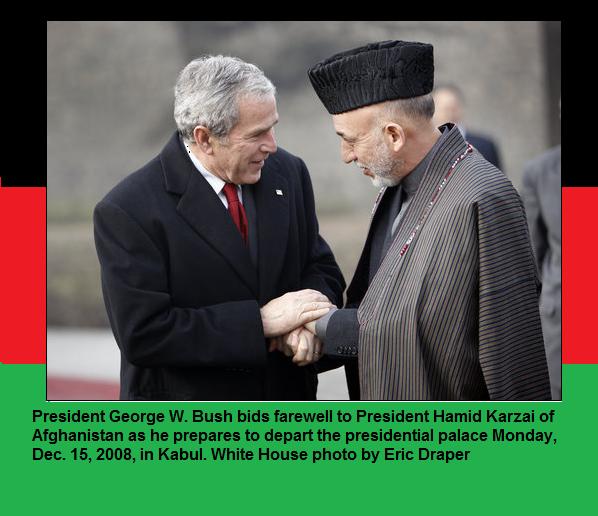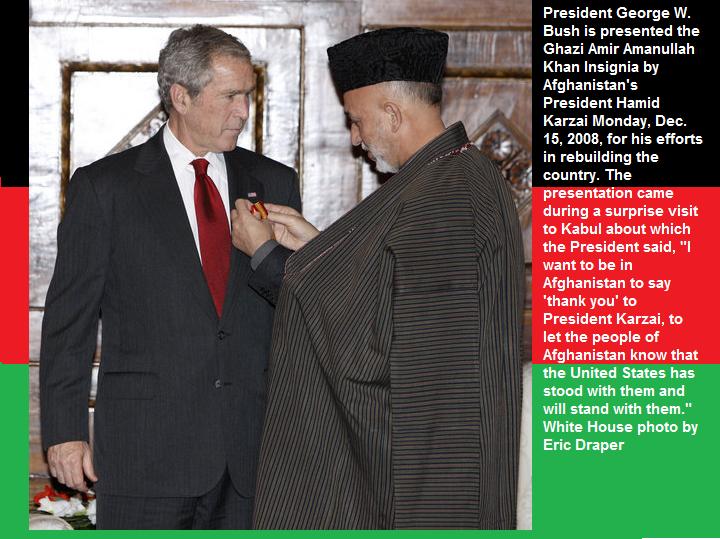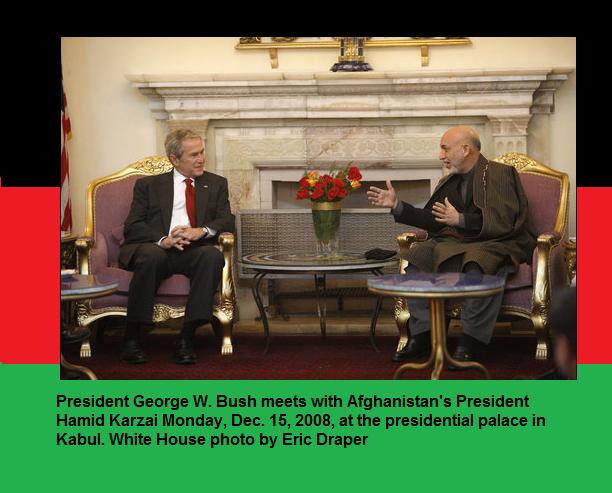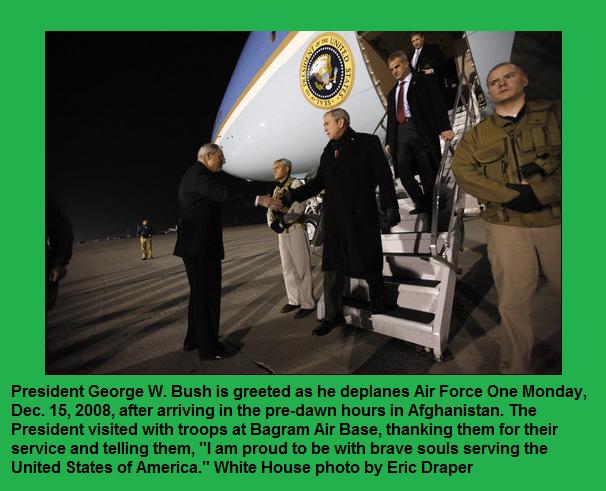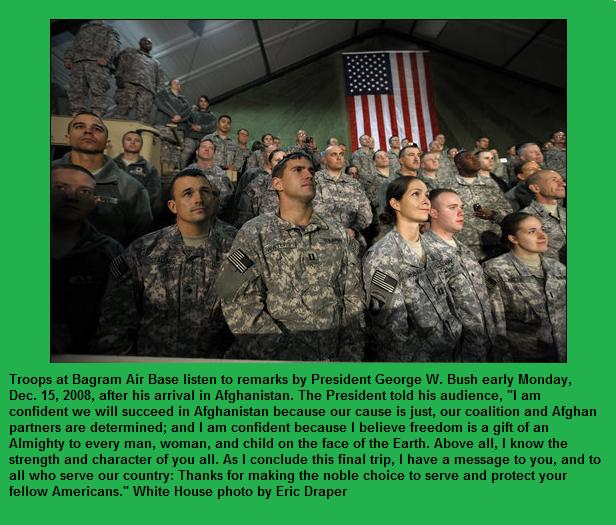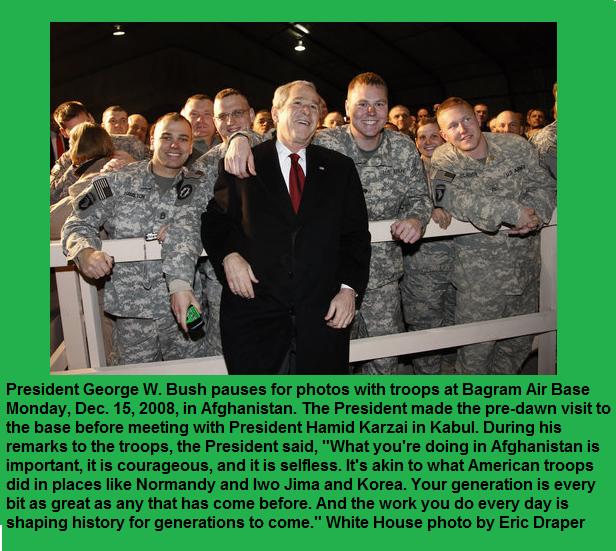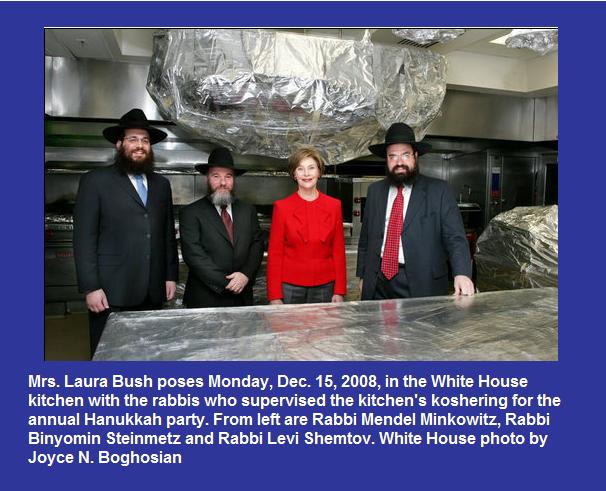|
President Bush Participates in Press Availability with Afghanistan President Karzai in Afghanistan
|
|
President Bush Visits with Troops in Afghanistan For Immediate Release 5:38 A.M. (Local) THE PRESIDENT: Thank you all very much. Thanks for the warm welcome. Thanks for coming out to greet me -- at kind of a strange hour. (Laughter.) General, I appreciate your accommodating what I'm calling Rudolph One. (Laughter.) After all, it is the holiday season. You might have heard, we made a little refueling stop in Baghdad earlier today. And now I'm proud to be back in Afghanistan. (Applause.) You might call it an early-morning wake-up call. Or in some of your cases, I might have cut your evening off. We won't go there. (Laughter.) In either case, I am proud to be with brave souls serving the United States of America. (Applause.) And my dear wife sends her very best regards. (Applause.) So, on behalf of Laura, and everybody else back home, merry Christmas, and a happy holidays. (Applause.) Congratulations on your tremendous accomplishments. And above all, thank you for volunteering to defend the United States of America. You know, they often say, what are you going to miss? I'll miss the airplane, of course. (Laughter.) But I'm mainly going to miss being the Commander-in-Chief of such an outstanding group of men and women. I appreciate Sergeant Major Vince Camacho for his service. I want to thank Ambassador Bill Wood, the Commanding General of U.S. Forces Afghanistan General David McKiernan; Brigadier General Mike Holmes, Commanding General 45th Expeditionary Wing. Soldiers of the 101st Airborne -- (applause.) I told the General that I had the honor of going to Fort Campbell the other day. (Applause.) I saw a lot of your comrades, and I saw a lot of your families. And they have a message for you: Air Assault! (Applause.) I thank the airmen of the 455th Air Expeditionary Wing. I kind of like your motto: Start right, finish strong. (Applause.) Yes, that sounds pretty good for a guy with 36 days left. (Laughter.) The soldiers of the 3rd Brigade Combat Team, 1st Infantry Division -- the Big Red One. (Applause.) Soldiers of the 1st Maneuver Enhancement Brigade, Task Force Warrior. (Applause.) I want to thank all the troops from our coalition partners. I appreciate your countries for supporting this noble cause. I want to thank all the civilians, the diplomats, the embassy personnel who are critical to our success. I thank all the other brave Americans here today, including members of the United States Navy, the United States Marine Combat personnel, FBI agents -- (applause) -- and last but not least -- (laughter.) They may sound small, but they're plenty tough. (Applause.) And last but not least, the 101st Army Band. (Applause.) You probably played some high notes to keep the folks awake. (Laughter.) Afghanistan is a dramatically different country than it was eight years ago. When I took office in 2001, the Taliban was brutally repressing the Afghan people. Girls were denied access to school. People who did not submit to the regime's radical beliefs were beaten in the public, or executed in soccer stadiums. Al Qaeda had freedom rein to operate the country -- in the country. And it was here in Afghanistan that the terrorists planned the attacks of September the 11th, 2001. After that date, America gave the Taliban a choice: You can turn over the leaders of al Qaeda, or you can share in their fate. And when they refused, our just demands were enforced by the United States military. And thanks to you, the Taliban has gone from power, the al Qaeda training camps are closed, and 25 million Iraqis are free. And the American people, your loved ones, are more secure. (Applause.) Removing the Taliban was a landmark achievement. But our work did not end there. See, we could have replaced one group of thugs with another strongman. But all that would have done is invited the same problems that brought us the al Qaeda safe havens and the attacks on America in the first place. Those were the mistakes of the 1980s and 1990s, and we were not going to repeat them again in the 21st century. So America set an ambitious goal -- to help Afghanistan's young democracy grow and thrive, and emerge as an alternative to the ideology of hate and extremism and terror. This is a difficult and long effort. It's not easy to do this. It would have been so much simpler to say we got rid of one bunch and here's another one. But that's not what we believe is right. We want to lay the foundation of peace for generations to come. We want to do the hard work now so our children and our grandchildren can grow up in a peaceful world. So we rallied good allies to our side, including every member of NATO. We've developed civilian experts in the form of civilian [sic] reconstruction teams. And together with the determined people of Afghanistan, we are making hopeful gains. Thanks to you, girls are back in school across Afghanistan. Does that matter? I think it does. I think it does. Thanks to you, boys are playing soccer again, and flying kites, and learning to be Boy Scouts. Thanks to you, access to health care is up dramatically. Thanks to you, Afghanistan's economy has more than doubled in size. And thanks to you, the Afghan people are preparing to go to the polls next year for another round of free elections. Thanks to you, Afghanistan has a democratic government that is no longer an enemy of America; it is a friend of America. The enemies of freedom in Afghanistan are determined, no question about it, and the fight has been tough -- I don't need to tell you. This is a large country; it has a long way -- it's a long way away from a modern economy with a viable infrastructure. It's hard to get around Afghanistan. Yet we have a strategic interest, and I believe a moral interest in a prosperous and peaceful democratic Afghanistan. And no matter how long it takes, we will help the people of Afghanistan succeed. As a sign of our commitment, we've increased American troop levels in Afghanistan. Our NATO allies have done the same. And so have the Afghan people -- Afghan army and police have grown. I call it a quiet surge. It's a surge that hadn't gotten much attention. But it has an unmistakable message: The Taliban has gone from power, and it's not coming back. Al Qaeda terrorists have lost their safe haven in Afghanistan, and they're not going to get it back. Afghanistan will be a successful society and a hopeful society and a free society. And Afghanistan will never again be a safe haven for terrorists to attack the United States of America. In recent months, the violence has increased in some parts of Afghanistan. This is partly because we're going into new areas where the terrorists have never been challenged before. And if the enemy are fighting back, they don't like it when we show up. But ultimately, they will be no match for the Afghan people or her coalition partners. And they're certainly no match for the men and women of the United States military. (Applause.) I am confident we will succeed in Afghanistan because our cause is just, our coalition and Afghan partners are determined; and I am confident because I believe freedom is a gift of an Almighty to every man, woman, and child on the face of the Earth. Above all, I know the strength and character of you all. As I conclude this final trip, I have a message to you, and to all who serve our country: Thanks for making the noble choice to serve and protect your fellow Americans. What you're doing in Afghanistan is important, it is courageous, and it is selfless. It's akin to what American troops did in places like Normandy and Iwo Jima and Korea. Your generation is every bit as great as any that has come before. And the work you do every day is shaping history for generations to come. Because of you, America has a strong friend and partner in the fight against extremism in a pivotal part of the world. Because of you, people across the broader East -- Middle East now have an example of a more hopeful path -- a model of liberty that can prevail over tyranny and terror. Because of you, killers who wanted to take the lives of Americans back home have been brought to justice before they reached our shores. And because of you and all who work to protect our nation, America has done something many said was impossible: We have gone more than seven years without a terrorist attack on our homeland. This time of year is especially a time when we thank the Almighty for our freedoms. And we think of those who laid down their lives to protect those freedoms. Back home their children are growing up without a mom or a dad. But all of our children are growing up with something else -- the promise of a safer America, the promise of a better world, and the more likelihood for peace. This is a lasting memorial -- all who have sacrificed here in Afghanistan. And thanks to you, that memorial will be achieved, and the sacrifice of your comrades will not have been in vain. We think of the comrades who have been wounded. Our nation pledges that we will give them all the care and all the support they need to recover. And finally, we think of your families back home. You've got a loved one wondering what you're doing, how you're doing -- I want you to do me a favor: When you get back to wherever you're getting back to, call them, e-mail them, or write them. Tell them you love them, and tell them the Commander-in-Chief thanks them for their sacrifice, thanks them for loving you like they do, and thanks for -- thank them for standing with you as you serve the noble cause of peace. I am proud to be with you. I thank you from the bottom of my heart. May God bless you, and may God continue to bless the United States of America. (Applause.) END 5:54 A.M. (Local) For
Immediate Release Office Provided by Sandra Englund, Catch4all.com, December 15th, 2008 -------------------------------------------------------------------------- President
George Bush trip was dangerous trip to iraq but, Security gained in
Iraq. Last month, attacks fell to the lowest monthly level since the
war began in 2003 it's unclear what will happen when the U.S. troops
leave. The
Bush administration and even White House critics credit last year's
military buildup with the security gains in Iraq. Last month, attacks
fell to the lowest monthly level since the war began in 2003. Still,
it's unclear what will happen when the U.S. troops leave.
Reported by Catch4all.com, Sandra Englund, December 16, 12:27 AM. Sources: President Bush Participates in Press Availability with Afghanistan President Karzai in Afghanistan President Bush Visits with Troops in Afghanistan President Bush Hosts Hanukkah Reception Fox News God
Allah - Does It Mean God? The
word "Allah" is the perfect description of the "One God" of monotheism
for Jews, Christians and Muslims! Is "Allah" only for Islam and Muslims?
[No! It is for All Three Abrahamic Faiths.] |

